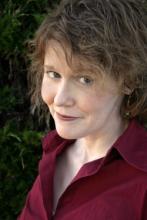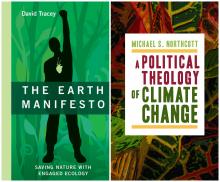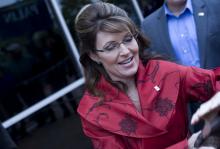Faith

ELIZABETH PALMBERG—Zab to her friends—says her motto is “Cherish each moment, even the ones that suck.”
Nine years ago, she was diagnosed with Hodgkin’s lymphoma. She has had her ups and downs in her battle against cancer, but many moments in that journey have undeniably sucked.
In 2001, Zab was a college professor in California when she applied to be an intern at Sojourners. We decided her Ph.D. (in Victorian literature) perhaps qualified her to do the data entry and fact-checking work required of our editorial intern, and when her yearlong internship was over we invited her to become a full-time member of the editorial staff.
She’s been gracing us, and our readers, with her brilliant analysis and quirky wit ever since. Her knowledge, passion, and insight informed and often challenged those of us who’ve worked closely with her—and led to outside recognition as well. In 2011, for instance, Zab joined a Witness for Peace delegation to Colombia, visiting communities engaged in the difficult work of peacebuilding and conflict resolution. Her report on the trip—the last feature she wrote for the magazine—was honored by the Associated Church Press as the best news article of the year.
In November 2012, she wrote on her blog, “Just as I was planning a big six-year hey-they-cured-my-cancer party, it turned out I have cancer again.” Months of difficult treatment followed, and she chronicled the good times and the bad with (most of the time) her sense of humor firmly intact. For instance, she wrote that “technically, the exact wrong thing to read [during chemotherapy] is Thomas Hardy’s Jude the Obscure, which also happens to be the wrong thing to read in almost *every* context—that book really puts the “ick” in ‘Victorian.’ My deepest apologies to the one class I forced to read it. I don’t know what I was thinking.”

CLIMATE CHANGE and its accompanying issues are mammoth topics. David Tracey’s The Earth Manifesto and Michael S. Northcott’s A Political Theology of Climate Change are ambitious and sound theoretical and practical treatments.
With different faith backgrounds, each brings to the task the urgency of the moment. Tracey is a Vancouver urban ecologist, a fiction and nonfiction writer, a writing teacher, and an avid housing co-op dweller with his wife and two school-age children. He has spearheaded several community garden co-ops. Northcott is a priest in the Church of England and a University of Edinburgh social ethicist who has written on understanding space and its sacred sharing, urban ministry and theology, and now this, his third book on climate change.
Tracey’s The Earth Manifesto dives right into the ecological mandates of our time and place. It gently and consistently employs an implicit Buddhist perspective to offer concise chapters—really a set of tools—to name, address, engage, and sustain a meaningful citizens’ involvement. These are expressed in two parts: three big ideas and three big steps. The ideas consist of “Nature Is Here,” “Wilderness Is Within,” and “Cities Are Alive.” Tracey’s three big steps are “groundtruthing”—engaging deeply in a place to shape one’s environmental efforts; political advocacy; and building a community to help spread a campaign for change.
Two concepts stand out vividly. Tracey’s explanation of groundtruthing conveys the need to test a theoretical perspective by getting right on the ground to verify its potential in the concrete. One intuits incarnational theology here. He also affirms the nature of engagement from its French origins to mean “someone passionately committed to a cause”: pledged, dedicated, or devoted. For me this summons the discipline of spirituality in the service of social justice.

Dear friend,
The diagnoses are grim. Fervent supporters and ardent critics of religion both point to your decline. An urgency, if not an all-out alarm, fills the air. There are those who hope beyond hope for your renewal and transformation. Others stand steadfastly by your side as they "wait and see." Still others wipe their hands of the whole ugly mess and leave you to your ever-more-inevitable demise.
I'm not sure what to do. But I know I love you.
I know that you have grown weary in a bewildering, fast-paced world less inclined to pause and listen in. I know you have clung to models of leadership, governance, and programming through which you reached prominence, but now seem sluggish in the world today. I know you have tried new methods and "relevant" techniques for attracting new life, but they did not pan out like you dreamed. I know you have been let down by ministerial leadership, and not just in the pulpit: in the boardroom, in the choir lofts, in the denominational office. In this time of shrinking attendance, recycled ideas, and diminishing resolve, I'm not sure what the magic cure is. Or if there ever was one. But I know I love you.
You left groceries on my family's doorstep when my parents could not make ends meet. You carried the weight of my family's grief when my sister drowned. You encouraged me when I felt so alone and afraid. You challenged me to live beyond myself and for those who are so often ignored. You surrounded me with gentleness and love on my wedding day. You gave me time-worn words and melodies to express the joy and lament of my spirit. You pointed to a holy feast big enough to include all of humanity, and you set a place at that table for me.
You introduced me to God.


Dear Church,
I received some distressing news today. Oh, I know you thought you’d kept it secret, but I answered the phone when the doctor’s office called to change your chemo appointment.
Chemo? Seriously? What, you thought I wouldn’t find out eventually? I know I seem preoccupied sometimes, but I’m not an idiot. I can see the signs.
I knew something was up when I saw you shrinking, little by little over time. Maybe other people couldn’t tell, but I suspected something bad was going on. You can paste on a smile, and listen to your happy music, and buy new stuff. But anyone who really knows you, realizes your body has been slowly betraying you.
Dying happens. I get that. What really makes me mad, though, is that you didn’t trust me enough to tell me. Maybe you didn’t know for awhile. I guess that’s possible. But the doctor had to have told you, right? I mean, at some point you decided to do something about it — if only to keep it a secret. And if you didn’t know, then you’re not who I thought you were.


Dear church,
Let me start off this letter by expressing my deep love and appreciation for you. I have been an active participant in the community of faith for about 10 years now, and I have been profoundly blessed, cared for, loved, and inspired to be a better human being through you. I have also seen — and even participated in — some of your ugliest and most unfaithful moments in recent history. But through all of these experiences, nothing but utter appreciation and love remains for you. I believe, in the words of Bill Hybels, that the church is the hope of the world. I believe in your great power and potential to renew and reconcile our broken world through the way of Jesus. I believe that you can do it. That we can do it, together.
With that said, there has been a lot of talk recently about your impending death. For a long time, I believed the hype. I saw the numbers of millennials who were walking away from the churches and both mainline and evangelical churches closing their doors. I was convinced that maybe the church had truly seen the end.
But I was recently reminded that what we have been witnessing in the West is not, in fact, the death of the church at all.













Most people in their right minds consider Sarah Palin’s statement about using waterboarding to “baptize” terrorists as insensitive at the very least. It further reinforces the notion that she will say or do nearly anything to grab a headline, even if it is at the expense of her own integrity, and perhaps that of her political cohorts or even her faith.
She’d be doing all of us a favor if she’d simply stop talking publically. But in as much as she continues to be afforded a microphone and speaking pulpit, we get to bear witness to her attempts to improvise a caricature of herself on the fly.
Perhaps the most disturbing part of the statement to me is not the brazenness of it, or even the apparent lack of self-awareness or personal filter. It’s that she’s actually speaking on behalf of a significant – albeit shrinking – subset of Christian culture in the United States. It’s the strain that believes that the Prayer of Jabez (a prayer about expanding one’s spiritual territory) is a Manifest Destiny of sorts from Jesus to his followers. We’re to reach to all corners of the earth, emboldened with a “be assimilated or be eliminated” mentality at our backs.